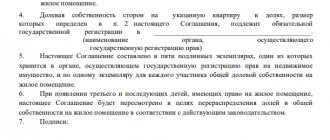Dividing property during a divorce can be one of the most stressful and contentious actions, second only to child custody issues. The question of how a privatized apartment is divided during a divorce is asked to a lawyer by all separating couples who have such housing.
Indeed, it’s difficult to figure it out on your own, since all real estate issues are resolved based on a variety of legislative acts, taking into account the norms described in the Insurance Code and the Civil Code of the Russian Federation. Also, Federal Law No. 1541-1 specifies the main provisions for the implementation of the privatization of state housing and municipal housing stock for social use in Russia.
Therefore, it is worth considering in detail the question of how privatized housing is divided during a divorce between former spouses and which of them can count on owning a common apartment.
Law on the division of a privatized apartment
The legislation provides for the right to use real estate on the basis of a social lease agreement, when the actual owner is the state or municipal authorities. Over time, such housing can be privatized with the complete transfer of property rights to a family or an individual.
This is a completely free procedure that allows you to become the owner of real estate. The procedure for dividing property rights will depend on the specifics of privatization.
Table No. 1 “Legal regulation of the issue”
| Name of the normative legal act | List of regulated issues |
| Family code | Part 2 art. 34 – all material assets acquired during marriage are recognized as joint property, regardless of whose name the property is registered in. Art. 38 – order of division of joint benefits |
| Civil Code | Art. 217 – the possibility of privatization of property by individuals is provided |
| Housing Code | Chapters 7 and – procedure and conditions for the use of real estate under a social tenancy agreement |
| Federal Law “On the privatization of housing stock” No. 1541 of July 4, 1991 | Section 2 – principles of privatization of housing facilities by individuals |
| Federal Law “On Privatization of Property” No. 178 dated December 21, 2001 | Features, procedure, methods of privatization of municipal and state property in Russia |
Legislation
The conditions and procedure for dividing a privatized apartment are regulated by the following regulatory legal acts:
- Law No. 1541-1;
- Civil Code of the Russian Federation;
- Family Code of the Russian Federation.
The provisions of these documents will be used by spouses for the division of common property on a voluntary basis, as well as during the legal process for the forced division of common property.
We recommend that important decisions related to real estate be made only after consultation with an experienced lawyer. Any mistake can cost you the loss of property and money, and solving the problems that arise may be impossible by legal means.
Rights to a privatized apartment
Whether the apartment will be divided during a divorce depends on when the privatization of housing was formalized. The second aspect that should be paid attention to is the participation of minor family members during the procedure for transferring property rights.
It is also necessary to pay attention to which family member wrote a refusal to privatize.
The owner is one of the spouses
There are two rules in law regarding the division of property during divorce. The first is material assets acquired after marriage registration - joint property of the spouses. The second is that property received through non-cash transactions by only one partner will not be divided during a divorce. Privatization is a non-cash transaction. In this case, everything will depend on the actions of the spouses.
If at the privatization stage one of the participants renounces property claims to the property, then in the future it will no longer be possible to claim part of the property.
Despite the lack of property rights, the partner will be able to continue living in the apartment. The social use agreement is valid indefinitely, regardless of the change of owner of the object.
Both spouses are owners
The order in which real estate is divided will depend on many factors. In practice, the following mechanisms and rules for implementing the procedure are known:
- Spouses are shareholders. A social rental agreement can be concluded with one family member or with all adult tenants. More often, at the privatization stage, documents on the transfer of property rights are prepared separately by each spouse. Upon completion of the process, the husband and wife become shareholders, that is, when registering property rights to the property in Rosreestr, each receives an extract from the Unified State Register of Real Estate, confirming the sole ownership of ½ share of the housing. In this case, there is no need to carry out additional division, since the object is already divided.
- Partners are co-owners. Privatization of real estate after registration of marriage without allocating specific shares automatically makes a man and woman co-owners. This means that each of them owns part of the housing, but which part exactly is not established by the documents. It is conventionally accepted that the partners’ shares in property rights are equal.
- Independent determination of shares by settlement agreement. Partners have the right to sign a notarial agreement, establishing who will get what share of the real estate.
- Judicial determination of shares. As a rule, the court proceeds from the equality of the spouses’ shares in the ownership of the apartment. It is extremely rare, but in practice it happens that during the distribution of a joint apartment/room, the court fixes different property shares. This may be due to a limited list of circumstances, as discussed below.
Children's participation in privatization
If a child was registered in the apartment, he must become a participant in the privatization. Moreover, this does not deprive him of the right to exercise the right to privatization again upon reaching adulthood.
If a child participates in privatization, he becomes a co-owner. This means that his share cannot be divided between parents. Just as a child cannot claim the personal property of his parents.
In the case where children did not take part in privatization, that is, only one family member became the owner, children will not be able to claim part of the apartment.
Is a gifted or inherited apartment divided when spouses divorce?
How is an apartment divided during a divorce if the owner is a husband or wife?
How to divide non-privatized housing
The law states that in a divorce, community property must be fairly divided.
However, time after time, divorcing couples turn to lawyers with the question of how a non-privatized apartment is divided and whether privatization of real estate is possible after a divorce. It happens that an apartment is provided by an enterprise where one of the spouses works, but it is registered for two, and both also have registration. In a few years, the couple may separate, but the apartment will remain non-privatized. In such a situation, most often one of the spouses moves to another place of residence, remaining registered at the old address. What to do with your share if the husband or wife tries to write their ex out of non-privatized housing? This “picture” emerges quite often.
Indeed, the court can make a judicial decision on the loss of the right of residence of one of the spouses, since the living space is not privatized.
Legal advice: you need to try to go through the privatization procedure before or during the divorce, agreeing with your former partner on the equality or inequality of shares.
Privatization of housing after divorce is not yet a very common practice, since it requires the collection of a large amount of documentation, certificates and evidence. A privatized apartment after a divorce is easier to divide when the spouses do not have children or if a marriage or settlement agreement has been drawn up.
The court will help make the final decision on the division of property, but the couple or their lawyers can, even before the trial, discuss the issue of property valuation and an amicable method, taking into account the norms prescribed in the current legislation. This can be the most emotionally difficult part of the divorce process.
When is it possible to divide the personal privatized apartment of the second spouse?
A personal privatized apartment is recognized as real estate acquired before or after marriage, when other family members renounced their claims to the object during the transfer of property rights. Therefore, it will not be possible to divide such an object.
Table No. 2 “Exceptions to the rules”
| Situation | Peculiarities |
| Marriage contract | The contract can be concluded between the participants before the wedding or after formalization of the official relationship. The content may indicate specific objects or it may refer to all objects that will be purchased in the future. |
| Settlement agreement on division of real estate | The document is prepared with the assistance of a notary when planning a divorce or after the end of a marriage. The parties can independently establish the procedure for dividing real estate:
|
| Court | If there are no legal claims to the property, the second spouse can still apply to the court to obtain part of the property. Possible results:
|
The role of the apartment privatization period during division
The rights of spouses to a privatized apartment directly depend on the moment of privatization:
- Before marriage. The apartment is personal property and is not subject to division.
- During the marriage, the spouses work together. Each spouse receives a share, which is his personal property and is not subject to division.
- During marriage with refusal of one of the spouses. The apartment is not divided, but the refused spouse can live in it for life.
- The spouses were not participants in the privatization and bought a privatized apartment during marriage. The property is considered jointly owned and is divided in half.
How to change or increase the share of property upon divorce
The division of a privatized apartment during a divorce can be challenged even in cases where there is joint ownership, which implies equal shares.
The grounds for filing a claim in court may be:
- disability of one of the spouses;
- presence of children under 18 years of age who live with their father or mother;
- a child with disabilities living with a husband or wife;
- a wife expecting a baby or on maternity leave;
- lack of wages or other income from one of the spouses for valid reasons.
All issues relating to certain circumstances are resolved in court. To prove something, you will need time and money for the services of a competent lawyer, but the result is worth it.
Voluntary division of a privatized apartment
Spouses have the right to independently determine the procedure for dividing the real estate after privatization in pre-trial or judicial proceedings.
Pre-trial procedure:
- oral establishment of principles for dividing property;
- drawing up a settlement agreement (on your own, with the help of a lawyer);
- contacting a notary who checks the document for compliance with the law and approves it.
Litigation: Once the trial begins, the parties have the right to draw up a settlement agreement. Algorithm for implementing the solution:
- drawing up a claim for division of an apartment;
- conducting negotiations with your spouse;
- making a decision on concluding a settlement agreement;
- drawing up a contract (either independently or with the assistance of a lawyer);
- transfer of the document to the court;
- obtaining a court-certified agreement.
The disadvantage of this option is the prohibition on re-applying to this court on the issue of division of the apartment. That is, it will not be possible to revise the section.
If there are minors
If a family has common children, their rights and interests must be taken into account when dividing the property of citizens. Problems will not arise if children participated in privatization on equal rights. But what if the child was born after registration of ownership of the apartment?
In this case, Art. 39 of the RF IC allows the court to deviate from the principle of equality of parties during division, taking into account the interests of minor citizens. In practice, if after a divorce the child remains to live with one of the parents, the spouse’s share will be increased.
Important: The law does not determine the specific conditions and size of the increase in the share; this will be decided in court. We advise you to consult our lawyers to clarify the possible options for handling such cases in court.
The court decision on division will not provide for the allocation of part of the property for the child, since the subject of the dispute is the property relations of the spouses. However, after the division of the apartment, nothing prevents the child from registering part of the property received after the division.
The procedure for dividing a privatized apartment in court
If it was not possible to resolve the conflict peacefully, only a district court of general jurisdiction will help. You must contact the authority located at the address of the real estate property.
You can initiate a resolution of a property dispute before a divorce, at the stage of divorce, or after receiving a divorce certificate. A husband or wife interested in receiving part of the property can file a claim with the court.
Documents and state duty
In addition to the statement of claim, you must have the following documents with you:
- a copy of the applicant's passport;
- extract from the Unified State Register of Real Estate;
- privatization agreement;
- a copy of the defendant's passport;
- receipt of payment of state duty;
- technical documentation for the property;
- conclusion of the assessment of a real estate property.
The state duty is established by articles of the Tax Code of the Russian Federation. The amount of deductions is calculated taking into account the price of the claim, that is, the estimated value of the disputed property. The plaintiff pays the state fee, but in the statement of claim you can indicate a request to divide the state fee with the defendant, taking into account the received shares of real estate.
You can learn more about the amount of state duty on property claims here.
Terms and procedure for consideration
The minimum period for making a decision on a dispute is 2 months. During this time, the court must evaluate the evidence presented and make a final decision.
An additional 30 days are allotted for the verdict to enter into legal force. This is the deadline for filing an appeal.
Judicial practice and judges' decisions
An analysis of judicial practice shows that in most cases a privatized apartment, if obtained after marriage, is divided in half. If we are talking about the premarital acquisition of property, then the maximum that the second partner expects is the right to temporary use of the property.
An example of the division of a privatized apartment from practice:
Citizen O. privatized an apartment in 2015, which he used as a social lease. In 2021, O. married citizen S. A marriage contract was not drawn up. In 2021, the couple filed for divorce and decided to immediately consider property disputes regarding the division of joint property.
The defendant, citizen S., filed a counterclaim with a request to divide the privatized apartment, citing the fact that cosmetic repairs had been made to the housing during the marriage. The woman provided receipts for expenses. The amount of money invested was 95,000 rubles.
The court refused to divide the property, since the invested amount was not significant and the market price of the property did not change due to repairs. Instead, the judge issued an order for the wife to temporarily reside in the apartment. The deadline for moving is 3 months from the date of entry into force of the court decision.
What should a spouse left without a share do?
If the spouse did not participate in the privatization process, then he does not have rights to the apartment. The division of the privatized apartment will take place without his participation. There is no way to correct the situation with the help of a lawyer. The privatization procedure, if it took place without violating the law, does not have retroactive effect.
Only its owners have the right to divide a privatized apartment. These include all persons who participated in privatization. If one of the spouses initially refused to take part in the procedure or did not have rights to it, then he will not be able to receive a share in the apartment even if it was privatized during the marriage. However, if such a spouse has permanent registration in the divided apartment and does not have any other home of his own, he can continue to live in it for an unlimited amount of time. It will not be possible to evict him from this apartment without personal consent under any circumstances.
Lawyer's answers to questions about the division of a privatized apartment
After the divorce and division of the privatized apartment, the husband stopped paying utility bills. What to do and where to go?
The spouse is required to pay his share of utilities, but only for those resources that he uses or that are used to support his share of the apartment. If a debt arises, the spouse should not contribute money for her husband. In case of formation of a large debt, it is necessary to apply to the district court with a statement of claim.
How to divide a personal account for housing and communal services in a privatized apartment after a divorce?
Splitting the account is allowed only if the partners have divorced, registered shared ownership of the property and continue to live on the premises. Initially, the HOA, management company or housing and communal services are involved in the procedure (depending on how the apartment building is managed). Shareholders submit separate handwritten applications with a request to split the payment. If the manager refuses to comply with the request, then the interested spouse can and should file a claim in the district court.
Features of privatized housing
If citizens live in an apartment or house under a social tenancy agreement, they must be prepared for the fact that they will not be able to fully dispose of this property at their own discretion. This means that such people do not have the right to carry out legal transactions with housing. They cannot sell it, donate it, etc. And in the event of a divorce, division of an apartment in this status is impossible.
However, such living space can be privatized. Federal Law No. 1541-1 establishes that privatization is a procedure in which a state or municipal apartment can be transferred into the ownership of the citizens living in it. It is carried out free of charge. The following have the right to participate in privatization:
- a person who appears in the status of an employer;
- members of the tenant's family living in the apartment. The exception is children under 14 years of age, who must be included in the privatization agreement regardless of their place of residence, if their parents are involved in it;
- citizens who have permanent registration in the privatized apartment.
Every citizen of the country has the right to take part in privatization. But the law allows it to be implemented only once.
Amounts of state duty and terms of consideration of the case
The division of a privatized apartment in court requires the payment of duty .
The payer is the plaintiff. The amount of the payment depends on the cost of the apartment; it is calculated in accordance with the standards contained in Article 333.19 of the Tax Code.
In particular, for property worth over 500 thousand you will have to pay 6,600 rubles plus 0.5% of the amount exceeding this price.
The statement of claim is submitted to the judicial authorities at the location of the property. Cases regarding the division of a privatized apartment are considered in the same way as any property disputes.
If the division is carried out along with a divorce, then the case is divided into two parts , for each of which a separate state fee is paid.
The statute of limitations for the division of an apartment is 3 years. A 60-day period is allotted for the consideration of the case. It is during this time that the first meeting should be scheduled from the moment the application is submitted. If there are special circumstances, the consideration of the case may be postponed more than once. There are cases of cases dragging on for years.
After the judge makes a decision, the decision is prepared within 5 to 10 days, sometimes the period for drawing up the decision takes up to 1 month. After the decision is made, a month is given to file an appeal in case of disagreement.
Division of property by mutual agreement or marriage contract
The mutual agreement has a pragmatic purpose. In this case, all acquired property during the marriage is divided. A marriage contract is drawn up to redefine the principles of property relations between spouses. Here you can indicate the rights of everyone if a situation arises when a divorce is required. When all controversial issues are resolved, after the divorce each party should have no claims left.
The list of property is not always specified in the marriage contract. You can only determine the type of claim rights. The contract often covers specific periods of time.
During a divorce, property can be divided by mutual consent. To do this, you need to draw up an agreement. For a document to have legal force, it is necessary to take into account the requirements of the Civil Code. Mandatory elements of the agreement for mutual division of property:
- Registration details of spouses. This includes information from your passport.
- Indication of status. Whether the spouses were previously married or are still in the process of divorce.
- Subject of the agreement. This includes the legal assessment of a privatized apartment.
- Register of property for division. It is necessary to indicate the price of the share, as well as the cost of the entire apartment.
- The name of the city where the property was registered.
- Signatures of each participant in the transaction.
You can draw up a contract for voluntary separation before the actual divorce or after. When the spouses have already divorced and the division of the privatized apartment has not been carried out, the document can be signed within the next three years.
Privatization concept
Privatization is the free transfer by the local administration or an authorized body of residential premises to persons living in it on a social lease basis into ownership.
Anyone who is currently registered in it at their place of residence (“registered”) can privatize an apartment. If someone does not want to participate in privatization, he can refuse it. The refusal of minor children is not allowed; they, regardless of their own wishes or the wishes of their parents, participate in the privatization of property.
You cannot privatize living space when;
- She is a servant;
- The building where the apartment is located is recognized as unsafe;
- The building where the apartment is located is recognized as a hostel;
- Located in a closed military town.
How to divide an apartment purchased on credit during a divorce
During a divorce, spouses have many questions regarding the upcoming dissolution of their marriage. Among them, the question of housing division often arises. Let's consider how the right of each spouse after a divorce to housing purchased during marriage (hereinafter referred to as an apartment), including with the use of a loan, is determined.
What property is subject to division?
As a general rule, all property acquired by spouses during marriage is recognized as their common joint property. Both spouses have equal rights to own, use and dispose of this property. This rule applies regardless of which spouse acquired it or which of them contributed money to purchase this property <*>. This rule also applies if one of the spouses in the marriage did not, for good reasons, have their own income <*>.
For reference, the property of each of the spouses is property <*>: 1) belonging to the spouses before marriage; 2) received by them during the marriage as: - gift; - inheritance. The court may recognize the property of each of the spouses as common property if it determines that in marriage, the value of the disputed property was significantly increased due to joint or personal investments of the spouses. For example, during major repairs or reconstruction; 3) for individual use, for example clothing, shoes. Jewelry and luxury items are not recognized as things for individual use - they belong to the common property of the spouses; 4) defined as personal in the marriage contract.
During a divorce, only “commonly acquired” property is subject to division. In this case, the share of each spouse is equal and amounts to 50% of the total property. Thus, as a general rule, when dividing an apartment, each spouse has the right to 1/2 of it <*>.
What methods of dividing an apartment are possible?
The apartment can be divided between spouses:
1. By agreement of the parties (for example, according to a marriage contract).
2. By court decision.
Since the division of an apartment represents the allocation of a share from it to each of the spouses, in practice the following options for resolving this issue are possible:
— divide the apartment into two equal isolated rooms, where each will have its own entrance, kitchen, bathroom and other utility rooms. However, the layout of apartments in most cases does not allow this to be done - this method is more typical for private households;
- allocate separate room(s) to each spouse and leave non-residential premises in shared ownership. In order to avoid disagreements, it is advisable for spouses to separate personal accounts and pay for utilities separately;
- “buy out” the share of the second spouse. In this case, the apartment will become the property of the spouse who made the “redemption”. This can only be done with the consent of the second spouse and only with money, i.e. compensation with other property is not allowed <*>. This method is convenient when dividing, for example, a one-room apartment;
— sell the apartment and divide the amount received from the sale. This method requires the consent and direct participation in the sale of the apartment of both spouses <*>.
One of the effective ways to come to an agreement and agree on the terms of division of an apartment, in our opinion, is to conclude a marriage contract. Through its conclusion, the spouses not only agree on all the conditions, spelling out each of them in detail. They also have documentary evidence of their agreements, which will protect them from possible disagreements and court proceedings.
In this case, the division of the apartment occurs according to pre-established agreements. This method can be called the most peaceful. At the same time, the marriage contract can also provide for other issues that are important for the spouses: about children, money for the maintenance of children and/or spouses, property, etc.
The practice of concluding a marriage contract is not common in our country. However, if the spouses have not yet divorced and are ready to peacefully resolve the “housing issue,” then concluding such an agreement will be a very effective way to legally divide housing. It can provide all the subtleties of such a specific issue. Thus, spouses can provide for different from the generally established requirements for the division of shares - not 1/2, but other proportions, up to the transfer of the entire apartment to one of the spouses. All conditions are individual and, as a rule, are not disputed in court.
Note! If the apartment was purchased with a loan and the spouses agreed that one of the spouses will repay the loan, then they must first obtain permission from the bank and only then have the document certified by a notary.
If you cannot reach an agreement, you need to go to court <*>. This can be done both during the divorce process itself and within three years from the date of divorce <*>.
When going to court, you must file a statement of claim. It usually states:
- the name of the court to which it is filed. As a rule, the claim is filed in court at the location of the disputed apartment <*>;
— full name and place of residence (location) of the plaintiff, his contact phone number, email address;
— full name and place of residence (location) of the defendant, his contact phone number, email address;
- the requirement and the facts that justify the requirement, evidence confirming them;
- the price of the claim, which corresponds to the cost of the apartment;
— signature of the plaintiff and date of filing the claim;
— list of applications. It can be:
— marriage registration certificate or divorce decision;
— birth certificate of children (if there are minor children);
— certificate of place of residence and family composition;
- checks, receipts, sales or contract agreements, other documents for the apartment (if available);
— conclusion on the assessment of the apartment;
— a document confirming payment of the state duty.
For reference, the state duty is 5% of the claim price - the cost of the apartment <*>.
For the defendant, you need to prepare a copy of the statement of claim <*>.
If the apartment was purchased with a loan
The legislation provides for the possibility of dividing an apartment that was purchased with a loan between spouses. To do this, you need to obtain the consent of the creditor bank. In this case, the bank will be involved in the consideration of this case as a third party who does not make independent claims <*>.
Depending on the terms of the agreement with the creditor bank and the conditions of division of the apartment, there are several options for repaying the loan, for example:
— after the division, each spouse repays the loan for their part of the apartment;
— the preferential loan is recalculated, resulting in early repayment of interest.
If the spouses have an outstanding loan, it is advisable to contact the bank before sending a statement of claim to the court. Only the bank will give you accurate information and possible ways to resolve it based on the terms of the concluded loan agreement.
It is also possible to repay the loan before the divorce. However, in this case, the bank’s consent will be required. Otherwise, it will be considered that your obligations to the bank have not been fulfilled <*>.
If you repay the soft loan in full ahead of schedule, which was received before January 17, 2012, you can obtain permission to sell the apartment due to a divorce <*>. This will allow the spouses to divide the proceeds from the sale of the apartment according to the share due to each of them. We believe that this option is the most convenient.
It is possible to obtain permission to sell an apartment purchased with a soft loan, if 5 years have not passed since its repayment, from the local executive committee. To do this, you need to contact the “one window” service and provide the required package of documents, including <*>:
— application (as a rule, issued in the “one window” service);
— passports or other identification documents of all family members living together with the owner;
- notarized written consent of the spouse, as well as other adult family members living together with the owner and having the right to own and use the apartment, as well as absent citizens who retain the right to own and use the apartment;
- technical passport and document confirming ownership of the apartment, share in the ownership of it;
— documents confirming the grounds for alienation of the apartment, share in the ownership of the apartment (divorce);
— a document confirming the repayment of a soft loan for construction (reconstruction) or purchase of an apartment.
What decision can the court make?
The court can make a decision on general grounds, dividing the apartment equally between the spouses in the proportion of 1/2. And in exceptional cases, it may change the ratio of shares on grounds taking into account <*>:
— interests of minors and disabled adult children in need of help;
- the interests of one of the spouses that deserve attention;
- evasion of work or spending of common property by the other spouse to the detriment of the interests of the family.
Also, the court may satisfy the request of one of the spouses to increase his share if he made the payment for the loan for the apartment independently from his own funds after the breakup of the family. A prerequisite is the presence of evidence that the second spouse deliberately evaded payment of the loan <*>.
Note: If there are several residential premises in the common property of the spouses and no agreement has been reached between them on their division, the court, taking into account the size, cost of the residential premises, family composition of the former spouses and other relevant circumstances, has the right to divide these residential premises, allocating to each of the participants in the common property separate residential premises <*>.
If, after dividing the apartment, the spouses live together and cannot agree on the procedure for using the apartment, they can go to court. The court will determine the procedure for using the apartment according to the shares of each spouse, as well as taking into account other circumstances, for example the presence of children, etc. <*>.







